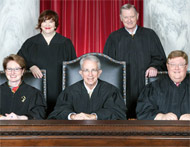Article from: www.thenewspaper.com/news/38/3826.asp
6/22/2012
West Virginia Supreme Court Rejects Traffic Stop for Missing Mirror
A missing side mirror does not justify a traffic stop according to the West Virginia Supreme Court.
 A driver should not be pulled over for a missing side mirror, the West Virginia Supreme Court ruled last week. Under consideration was the traffic stop that happened on January 28, 2010, after Huntington Police Officer James Leist saw the vehicle belonging to Jerrod Dillon drive past without a passenger side mirror.
A driver should not be pulled over for a missing side mirror, the West Virginia Supreme Court ruled last week. Under consideration was the traffic stop that happened on January 28, 2010, after Huntington Police Officer James Leist saw the vehicle belonging to Jerrod Dillon drive past without a passenger side mirror.
Leist pulled the car over and ordered a drug-sniffing dog to search the vehicle. Marcella Dunbar, a passenger, was busted for drug possession after the canine sniffed out controlled substances in the vehicle. Dunbar was convicted despite his protestation that the traffic stop was illegal and the evidence obtained from it should be suppressed.
Before an officer can legally pull over a motorist, he must have reasonable suspicion that a crime has been or is about to be committed. Prosecutors argued Dillon's car had defective equipment because the vehicle was originally equipped with a side mirror that no longer functions. The high court ruled that neither West Virginia nor Ohio -- the state in which the car in question was registered -- specifically require a side mirror. Instead, drivers only need an ability to see behind their vehicle, which is something that can be accomplished with a single mirror.
"Every motor vehicle which is so constructed or loaded as to obstruct the driver's view to the rear thereof from the driver's position shall be equipped with a mirror so located as to reflect to the driver a view of the highway for a distance of at least two hundred feet to the rear of such vehicle," West Virginia Code Section 17C15-35 states.
The high court cited appellate decisions in Georgia and Virginia that came to the same conclusion in similar cases. It also cited a Florida Supreme Court ruling that shot down the argument that state law allows stopping any car if "any required part or equipment" is "not in proper adjustment or repair." Broadly interpreting this section as applying to items not required by law would, the court argued, allow traffic stops of cars with broken radios and air conditioners.
"Based upon this court's determination that the lower court incorrectly concluded that the vehicle at issue in this case was being operated in violation of West Virginia Code Section 17C-15-1(a), this court finds that the traffic stop initiated in this case was improper," the justices ruled. "Consequently, the evidence leading to the petitioner's arrest for drug violations is not admissible evidence and should have been suppressed."
A copy of the decision is available in a 90k PDF file at the source link below.
Source: West Virginia v. Dunbar (West Virginia Supreme Court, 6/13/2012)
Permanent Link for this item
Return to Front Page
 A driver should not be pulled over for a missing side mirror, the West Virginia Supreme Court ruled last week. Under consideration was the traffic stop that happened on January 28, 2010, after Huntington Police Officer James Leist saw the vehicle belonging to Jerrod Dillon drive past without a passenger side mirror.
A driver should not be pulled over for a missing side mirror, the West Virginia Supreme Court ruled last week. Under consideration was the traffic stop that happened on January 28, 2010, after Huntington Police Officer James Leist saw the vehicle belonging to Jerrod Dillon drive past without a passenger side mirror.